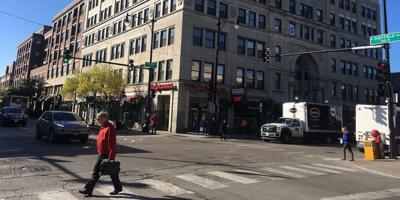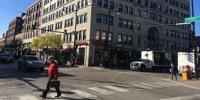
A pedestrian crosses an intersection in Chicago.
CHICAGO - After winning a court order requiring Chicago city taxpayers to pay for upgrades to city intersections to make them safer for the blind, disability accessibility advocates have returned to court in a bid to use federal law to similarly force the city to pay untold amounts of taxpayer dollars to repair and replace sidewalks and curb ramps to make city thoroughfares more accessible for people with disabilities.
On Sept. 10, attorneys with the Disabilities Rights Advocates organization and from the firm of Latham & Watkins, of Chicago, filed suit in Chicago federal court against the city of Chicago.
The lawsuit was filed on behalf of named plaintiffs Cherlnell Lane, identified as a resident of Chicago's Washington Park neighborhood; Iliana Rivera Haven, a resident of Chicago's Near West Side; Michele Lee, a resident of the Streeterville neighborhood; and Kevin Sullivan, a resident of northwest suburban Palatine.
All of the named plaintiffs are identified as people with mobility disabilities who require either wheelchairs or powered scooters to move about.
However, the lawsuit was brought as a class action, potentially on behalf of hundreds of thousands of other Illinois residents with disabilities, who similarly rely on wheelchairs or powered scooters for mobility.
In the lawsuit, the plaintiffs assert the city has not invested enough in maintaining sidewalks and curb ramps, which people with mobility disabilities need to navigate the city's street network and other public spaces.
They claim the city's "failure to use a coordinated, proactive system to maintain its pedestrian rights of way," instead favoring "complaint-based" programs to deal with alleged problems as they pop up, violates the rights of people with disabilities under the federal Americans with Disabilities Act and another federal law, known as the Rehabilitation Act.
The plaintiffs assert both laws require the city to improve and maintain its sidewalks and curb ramps to ensure they are accessible to people with wheelchairs or others with mobility disabilities.
“Without accessible, safe sidewalks, people with mobility disabilities cannot fully and actively participate in our society. We need [safe sidewalks] to go to work, attend school, go to church, visit family and friends, and enjoy our city. As a lifelong Chicagoan, I am serving as a plaintiff in this case to improve sidewalk accessibility for all of us with mobility disabilities,” said plaintiff Iliana Rivera Haven in a provided statement.
In their lawsuit, the plaintiffs say the issue that prompted them to sue is not a new concern.
In 2007, Chicago settled an initial lawsuit brought under the ADA law, at that time asserting the city had failed to "install, repair and maintain curb ramps" to maintain disability access - rules they said should apply to public entities who provide services as they do to private businesses and other places of public accommodation.
In that settlement, they say, the city agreed "to invest millions of dollars to install thousands of curb ramps and to implement systems to address curb ramp accessibility."
However, the plaintiffs assert the city has failed to live up to its deal, and has "stopped many of the systems it had implemented as part of that settlement and has failed to adequately maintain Chicago's curb ramps."
"Across the City, curb ramps are cracked, deteriorated, and in a state of disrepair. They often have steep slopes, excessive changes in level at the top or bottom of the ramp, and allow water accumulation. At several locations, legally required curb ramps are missing altogether," the lawsuit says.
"Chicago’s sidewalks, crosswalks, and other pedestrian passages are similarly riddled with access barriers. Many sidewalks are deteriorated, cracked, crumbling, sunken, uplifted, uneven, covered with holes, and/or overgrown with vegetation. They often are too narrow to traverse. And many crosswalks are deteriorated or damaged with excessive slopes, potholes, cracks, and other gaps in the surface, as well as abrupt changes in grade," the lawsuit said.
The lawsuit asserts "these access barriers ... negatively impact people with mobility disabilities throughout the City on a daily basis," allegedly forcing people with disabilities to find alternate routes, at best, or allegedly risk injury or even death" traveling in the street with cars and other motor vehicles to avoid the sidewalks.
They further assert the city has shifted to a system in which repairs and maintenance are only conducted when residents complain. However, they say those complaints allegedly often "languish for years before resolution."
The complaint asserts "more than 20,000 requests for sidewalk improvements have been open for at least a year, and more than 6,000 have been open for more than three years."
The lawsuit seeks a court order requiring the city to "ensure all future new construction and alterations" to city streets and sidewalks are accessible under the ADA; and "undertake prompt measures" to repair and upgrade existing deteriorated or allegedly non-compliant sidewalks and curb ramps, and construct new curb ramps and sidewalks in other places in the city in which such improvements allegedly are needed to comply with the ADA.
They are also asking the court to order the city to change its policies and procedures to more proactively evaluate, assess and repair sidewalks and curb ramps, allegedly to comply with the ADA.
The lawsuit marks just the latest launched by the Disability Rights Advocates organization against the city.
APS devices emit sounds and vibrate a tactile button, enabling pedestrians to hear the status of the Walk and Don't Walk signs to know whether it may be safe to cross the street.
It is not known how much this may ultimately cost Chicago's taxpayers. However, according to a report published in 2023, New York City incurred a median cost of about $56,000 per intersection to install APS in that city in 2020. Actual cost per intersection ranged from a minimum of $14,000 per intersection to as much as $150,000, depending on the nature of the intersection to be remediated using APS, the New York report said.
When the $56,000 New York City median is multiplied across at least 2,800 Chicago intersections included in the "remedial plan" ordered by the court, the cost could easily exceed $157 million.
It is similarly not known how much a court order forcing the city to install, upgrade and repair curb ramps and sidewalks could cost the city and taxpayers, should the Disability Rights Advocates prevail in court.
The plaintiffs are represented by attorneys Rachel M. Weisberg, Emily Roznowski, Scott Gordon and Eliana Fisher, of Disability Rights Advocates, of Chicago, New York and Berkeley, California; and Eric R. Swibel, Jack M. McNeily and Dylan Glenn, of Latham & Watkins, of Chicago.



